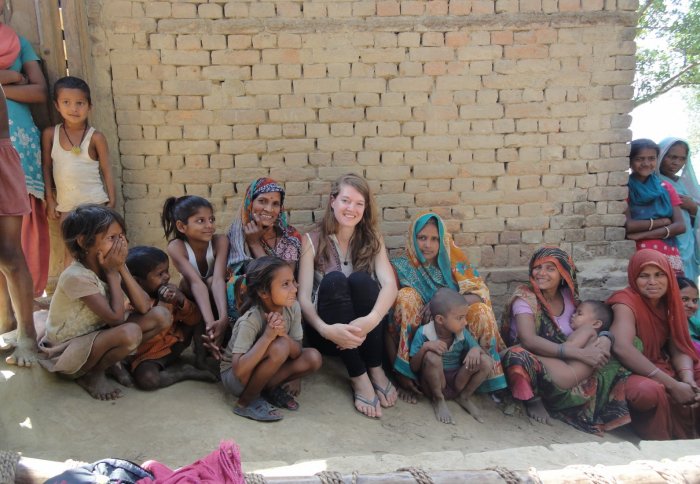Students fight global poverty through entrepreneurship competition

Clementine Chambon in a rural Indian community that could benefit from her business idea
Four teams of students from Imperial College London have won a start-up competition to help tackle global poverty.
The competition, which was open to students across Imperial, was organised by Imperial College Business School as part of a partnership with the charity, Global Action on Poverty (GAP). Students pitched their innovative and entrepreneurial ideas on how to eradicate poverty in the world to a panel of judges from Global Action on Poverty and the Business School.
One student from each of the four winning teams will have the opportunity to attend a three-day event in India in February 2016, at Global Action on Poverty’s flagship event at the Gandhi Ashram, Ahmedabad - the former residence of Mahatma Gandhi. During this event the students will get to meet other social entrepreneurs from all over the world and take part in workshops and one-to-one interactions with mentors and catalysts – entrepreneurs from companies who are looking to facilitate social change in business or technology.
CREATING RURAL ENTREPRENEURS
The winning teams include Raahat, a project that aims to improve lives in rural communities in India by empowering people with the practical skills needed to increase their income and provide better support for their families. The project will focus on ways to boost the rural economy such as helping citizens develop branded goods which could be sold online, improving access to healthcare and bridging the skills and knowledge gap.
ASSISTING AFRICAN FARMERS
Another winning team was Impala, whose business idea is a database and app that will help African farmers to make better sales and purchases by overcoming the current lack of information available regarding pricing, suppliers and competitors. The project aims to help the farmers achieve a fairer price for their products at wholesale and ensure that customers get better value for their goods.
PRODUCING CLEAN ELECTRICITY
Other successful projects included Oorja, an idea by Clementine Chambon, a PhD student from Chemical Engineering and a runner-up in this year’s Althea-Imperial prize competition. Oorja aims to build and install decentralised, easy to operate plants to co-produce clean electricity, household cooking gas and biochar from abundant rice husks, for off-grid villages in rural India, specifically in Uttar Pradesh where they would be managed by micro-entrepreneurs and women’s self-help groups.
PROVIDING CLOTHING
Need for Clothing aims to improve the lives of people in deprived communities in India by providing better access to clothes. The project would feature a web and mobile platform designed to connect NGOs, donors and volunteers to keep more efficient track of clothing collection and distributing operations – ensuring that the quality, correct sizing and quantity of clothes from donors get to the people who need them most.
Dr Paolo Taticchi, one of the judges from the Business School said: “Imperial College Business School champions the use of innovation and entrepreneurship to address the major challenges facing society, such as global poverty, so we are delighted to be teaming up with Global Action on Poverty for this initiative. All the students came up with proposals that demonstrate key business skills together with an awareness of the issues facing deprived communities around the world.”
Manisha Dahad, responsible for Partnership Engagement at Global Action on Poverty said: “I was impressed by the students’ incredible ideas and passionate commitment to creating social change through entrepreneurship. The standard of entries was very high and I was moved by the presentations, which demonstrated real passion and confidence. It was fantastic to hear about ideas which could provide the solution to eliminating poverty by empowering communities and generating social and economic wellbeing.”
Article text (excluding photos or graphics) © Imperial College London.
Photos and graphics subject to third party copyright used with permission or © Imperial College London.
Reporter
Laura Singleton
Communications Division